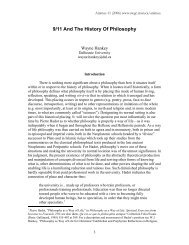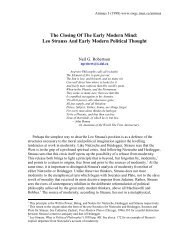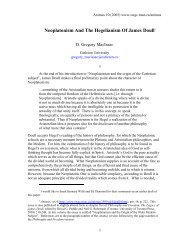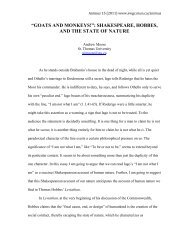Floy E Andrews, On Reading Philosophy after Analytic Philosophy.
Floy E Andrews, On Reading Philosophy after Analytic Philosophy.
Floy E Andrews, On Reading Philosophy after Analytic Philosophy.
You also want an ePaper? Increase the reach of your titles
YUMPU automatically turns print PDFs into web optimized ePapers that Google loves.
ANDREWS: ON READING PHILOSOPHY AFTER ANALYTIC PHILOSOPHY<br />
If not in mathematics, then how about in natural science Kant turned to the traditional<br />
categorical logic, to the Table of Judgments, for the clue to the discovery of the<br />
categories. But Strawson says if we are to take the clue from formal logic seriously, we<br />
must recognize there are different logics and so must make a choice. He suggests we will<br />
not go far astray if we take "current" logic "in which economy of primitive concepts has<br />
been so assiduously pursued as our guide." 41 It is, of course, the logic of truth-functional<br />
composition and quantification. Not surprisely therefore,<br />
The results of the appeal to formal logic [the logic of PM] are not merely<br />
meagre. Their meagerness is such as to render almost pointless any critical<br />
consideration of the detail of Kant's derivation of the categories from the<br />
Table of Judgments. 42<br />
But the results do have their use. When Strawson turns to the question "What in general<br />
must be true of a world of objects in which we make empirical judgements, determined as<br />
true or false, in which we predicate concepts of identifiable objects of reference" he<br />
answers<br />
...we are left with something; if not with proof, yet with reason for<br />
entertaining favourably an exceedingly general conclusion: viz. that any<br />
course of experience of which we can form a coherent conception, must<br />
be, potentially, the experience of a self-conscious subject and, as such,<br />
must have such internal, concept-carried connectedness as to constitute it<br />
(at least in part) a course of experience of an objective world, conceived of<br />
as determining the course of that experience itself. 43<br />
It is more than coincidence that Strawson should have found in his work on Kant, <strong>after</strong><br />
the mutilation he preform, that posing a question in imitation of Kant on what is there in<br />
the "current logic", he finds no synthetic a priori judgments but rather the opposite, the<br />
naive realism he himself expounded in his previous book Individuals. He comments to<br />
Magee: "... one obvious connection ... is, I suppose, that the actual structure of our<br />
conceptual scheme, as described in Individuals, turns out really to have rather a lot in<br />
common with the necessary structure as revealed in The Bounds of Sense." We need go<br />
no further. What is acceptable in the Critique, <strong>after</strong> extraordinary cutting and straining, is<br />
what Strawson has himself written elsewhere! The analysis of Kant turns out to be an<br />
analysis and commentary on Strawson's own work and its quite direct relation to<br />
contemporary logic. Nothing could be farther removed from Kant's achievement in the<br />
Critique than the `realism' of Strawson's position. This is a most remarkable illustration<br />
of the results of putting the works of older philosophy into the hands of linguistic analysts<br />
for their sort of reconstruction.<br />
41 Ibid., 81.<br />
42 Ibid., 82.<br />
43 Ibid., 117.<br />
106

















